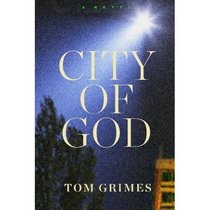Search -
City of God: A Novel
City of God A Novel
Author:
CITY OF GOD Kirkus Reviews-- ***starred review A near-future novel that depicts with savage glee the economic-driven Armageddon awaiting us: a choreographed, televised race war brought to you by your local sponsors. The author of two baseball-oriented novels (A Stone of the Heart, 1990; Season's End, 1992), Grimes here makes a quantum leap in... more »
Author:
CITY OF GOD Kirkus Reviews-- ***starred review A near-future novel that depicts with savage glee the economic-driven Armageddon awaiting us: a choreographed, televised race war brought to you by your local sponsors. The author of two baseball-oriented novels (A Stone of the Heart, 1990; Season's End, 1992), Grimes here makes a quantum leap in... more »
ISBN-13: 9780393037890
ISBN-10: 0393037894
Publication Date: 8/1995
Pages: 100
Rating: 1
ISBN-10: 0393037894
Publication Date: 8/1995
Pages: 100
Rating: 1
5 stars, based on 1 rating
Genres:




